
Before houses had glass windows, they had shutters. Built with either board-and-batten or stile-and-rail construction, the shutter quickly evolved to become a sophisticated layer of protection for the window, complete with specific and unique hardware fittings. Understanding how shutters function and operate is essential to choosing and mounting pairs that are appropriate to the house and look as though they could be closed at a moment's notice.
THE PRO TIP
After working on shutters with caked-on paint, ditch your work clothes and take a shower before picking up children or pets-and before eating. Sawdust is one thing. Lead dust is quite another. Consider wearing a mask. -NATE SKILES
Need to match an existing shutter?
Several manufacturers will replicate new shutters from an original. Repairing shutters yourself requires some skill but much of the work is repetitive: stripping paint, patching with epoxy, repainting to keep them operable.
Beyond their many practical uses, shutters add architectural relief and balance to a house when they're properly sized and hung. The oldest types include board-and-batten (used as rudimentary window coverings when glass for windowpanes was not available) and fixed-louver shutters, which allowed for privacy while admitting light and air.
Board-and-batten shutters are composed of long vertical boards secured by cross members. Variations include tongue-and-groove with interlocking planks. In louvered shutters, slats slanted at an angle are held in place by stiles and rails, as with door construction.
This story is from the July - August 2023 edition of Old House Journal.
Start your 7-day Magzter GOLD free trial to access thousands of curated premium stories, and 9,000+ magazines and newspapers.
Already a subscriber ? Sign In
This story is from the July - August 2023 edition of Old House Journal.
Start your 7-day Magzter GOLD free trial to access thousands of curated premium stories, and 9,000+ magazines and newspapers.
Already a subscriber? Sign In

Navigating the Lumberyard - Here's some lumber lingo you should know before you venture into a lumberyard.
Here's some lumber lingo you should know before you venture into a lumberyard. Almost everyone fixing an old house will end up at a lumberyard-whether it's a local supplier or the organized aisles of a big-box home-improvement store.

a farmhouse renewed
Sensitive renovations and restoration work preserved a house that dates to 1799.
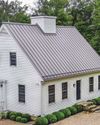
AN OVERVIEW OF METAL ROOFING
METAL ROOFS ARE RESURGENT, FOR GOOD REASONS.
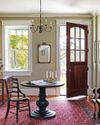
ENDURING BEAUTY IN WALLS of STONE
Now back in the family who had been here since 1830, the old farmhouse is again ready for generations to come. Additions dating to 1840 and the 1950s were preserved.

ARCHITECTURAL DETAILS COME TO LIFE
Owners and their designer celebrate the unique features of a 1912 Arts & Crafts Tudor.
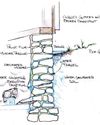
For a Wet Basement Wall
If there's problem common to old houses, it's a wet basement. I'm not talking about occasional flooding, but rather a basement that apparently seeps or leaks after even a rain shower or during snowmelt. Several approaches are available; sustainable solutions will get to the root of the problem.
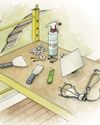
Patching a Plaster Wall
Fix a hole in the wall with a few common tools and some drywall supplies. Practice your technique!
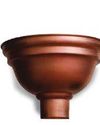
Roofing & Siding
Make note of these historical and unusual materials for the building envelope.
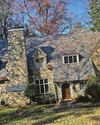
The Riddle of the water
When water incursion happens, the roof isn't necessarily the culprit. Maybe snaking a drain line, or clearing debris from a clogged gutter, temporarily will stem a leak. But a recurring problem usually means other forces are at work. It takes persistence-and a team with the right skills and patience—to identify the source and apply a solution.

Light-filled Craftsman Redo
For a dark kitchen in a 1914 Illinois house, the trick was anchoring white expanses with woodsy warmth.